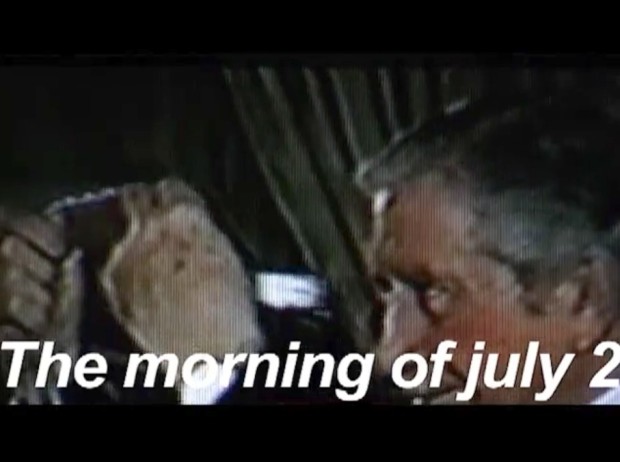An iconographic and text archive related to communication, technology and art.
☛ Still from Las Mujeres de Pinochet (Pinochet’s Women) by Eduardo Menz, Canada, 2005, Spanish with English subtitles, 12 mins. Still @ 02:39.
September 11, 2013 marks the 40th anniversary of the military coup that allowed Augusto Pinochet to take control of the government in Chile, a control he kept for 17 years. The short, 12-mins experimental film Las Mujeres de Pinochet, embedded below, was made a couple of years ago by Eduardo Menz, a Canadian filmmaker from Chilean descent. It is better, I believe, to watch it without any further introduction. One should use headphone, if possible, and keep the sound level normal: the soundtrack is faint at first, but will increase as the film progress.
The force of Menz’s short film lies in the way it offers itself. Using audiovisual excerpts from Patricio Henriquez’s documentary Images d’une dictature (1999), Menz opens two quite distinct windows on the same historical event: Pinochet’s dictatorship. One evokes the dictatorship from the perspective of Cecilia Bolocco, who in 1987 became the first Chilean to win the Miss Universe beauty pageant. The other presents an excerpt from the testimony Carmen Gloria Quintana, a woman who was set aflame by the military in 1986 while she was protesting Pinochet’s regime.
This, one could argue, is the object of the film: the violent dissonance between the ideals promoted by a political regime and the way it acts towards its population (a dissonance that is far from being unique to Pinochet’s dictatorship). However, Las Mujeres de Pinochet is not simply concerned with showing this dissonance.
The two windows it opens are far from being transparent. On the contrary, they are “in the way”: blocking the view, so to speak. The image is noticeably manipulated. Menz re-records Patricio Henriquez’s footage as it plays in loop on a television set. At the same time, he very slowly zooms on the screen, to the extent where the image is sometimes reduced to abstract flashes of colors. The audio context is also manipulated. First, the testimony of Carmen Gloria Quintana is heard over and over again alongside a video loop of Miss Universe being congratulated by Pinochet. Then, commentaries about the beauty queen are heard alongside video footage of Carmen’s severely burned face.
As a result, the cinematographic experience is not straightforward and quite unsettling: it takes some time to make sense of what is happening. I believe the effect is even stronger for those who do not understand Spanish, for the English subtitles are not readable at once, but progressively revealed as the film progresses.
Instead of simply using the cinematographic medium to tell the story of Pinochet’s dictatorship, Menz’s short film is built in such a way that it provides the opportunity to experience dissonance itself. To a certain extent, it succeeds in making its brutal object present, that is affectively and cognitively actual, even 40 years after the coup.
Eduardo Menz’s latest film, Acrobat, was presented at the 2013 Locarno International Film Festival. His previous film, A Film Portrait on Reconstructing 12 Possibilities that Preceded the Disappearance of Zoe Dean Drum, won the Best Experimental award a the 2013 Brooklyn Film Festival. He currently lives and works in Montreal.
- By Philippe Theophanidis
- on
- ― Published in Art, Communication, Movies
- Tagged: affect, Chile, dissonance, Eduardo Menz, exprimental, government, media, presence, representation, violence

